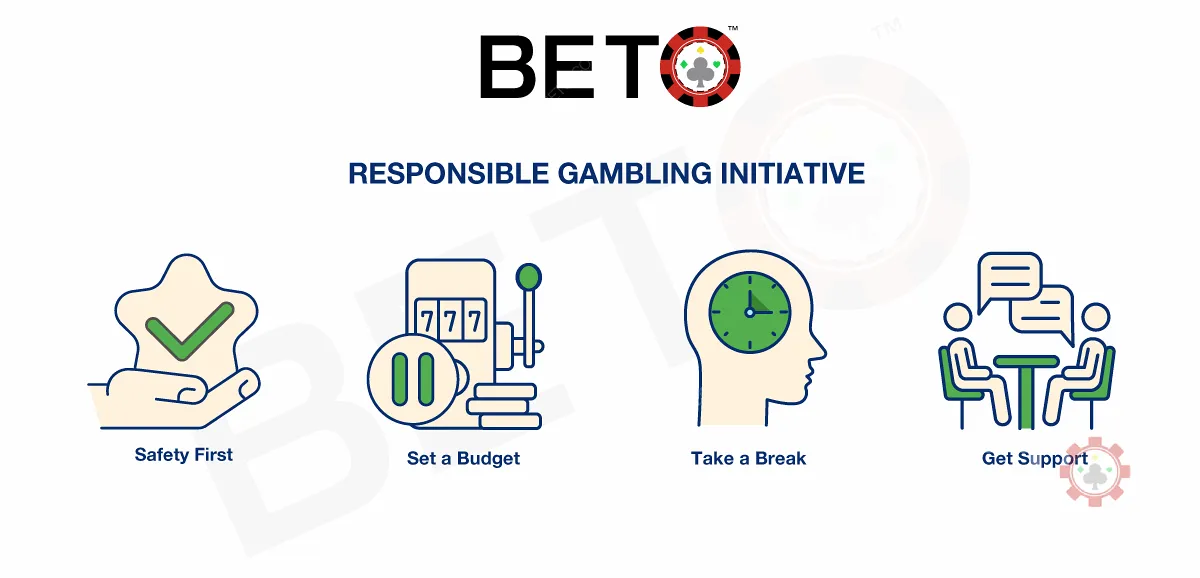
Written by: Kim Birch | The review was last updated: 12 November 2022 | Fact-check by: Jasmin Williams


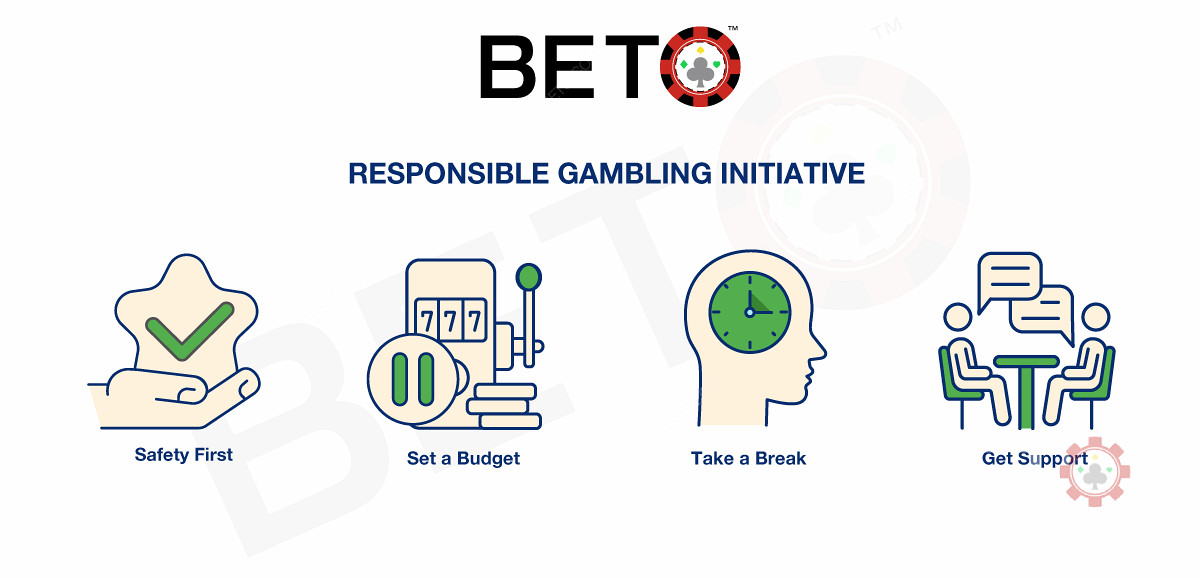
BETO and Responsible Gambling
For most people, gambling online is fun and is used for entertainment. However, for a small minority of people, gambling online can be a problem.
At BETO, we believe that responsible gambling is the best approach for everyone. We work hard to promote safe and responsible online gambling operators and provide information and guidance to those who may be unable to stay in control of their gambling. We hope our efforts will help keep the internet a safe place for all users, no matter their risk tolerance level.
The licensed websites BETO recommends all offer the following functionality:

Responsible Gambling - Safety when Playing Real Money Games Online
BACK TO TABLE OF CONTENTS
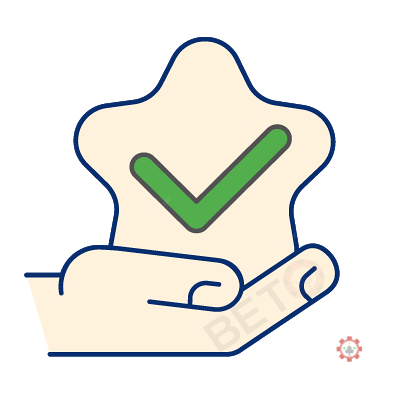
Why are Responsible Gambling important?
Gambling addiction is a severe problem that affects a small percentage of the population. While most people can enjoy casino games without any problems, some are more susceptible to developing an addiction.
Online casinos and the gambling industry are now employing Responsible Gaming teams to raise awareness of the issue and help prevent problem gambling. These teams work to educate players about the warning signs of gambling addiction and make sure that marketing efforts are not targeting vulnerable players.
This article will cover what gambling addiction is, how to identify if someone is addicted, and the different ways casinos combat addiction. We will also provide a list of resources if you or someone you know is struggling with gambling addiction.
BACK TO TABLE OF CONTENTS
Safer gambling means taking responsible steps to reduce the risks associated with gambling. Such practices can include setting financial limits, sticking to a budget, and only gambling with money that you can afford to lose. Safer gambling can also involve taking breaks from gambling or choosing not to gamble at all.
People who promote safer gambling strategies typically think of gambling as one form of entertainment. They factor gambling into their household budget by setting spending limits and sticking to them. They don’t expect to win back the money they’ve lost, nor do they think of gambling as a way to earn money. It’s important to remember that all gambling activities have risks and to enjoy safer gambling. You must be aware of the risks and how you can minimize them.
Social responsibility in online gambling refers to the responsible conduct of a gambling operator and players in regard to minimizing harm to both parties.
There is no universal definition of social responsibility in online gambling, as the concept is relative to a given jurisdiction's laws and regulations. However, generally speaking, things like:
People who gamble excessively, lose control of their gambling, or get addicted to gambling might be harmed. The gambler is not the only one who suffers. Families, friends, communities, and companies are all affected.
Proactively communicating early and in the appropriate way can assist someone in maintaining control of their gambling and retaining them as a customer. This technique is more sustainable for your company in the long run.
BACK TO TABLE OF CONTENTS
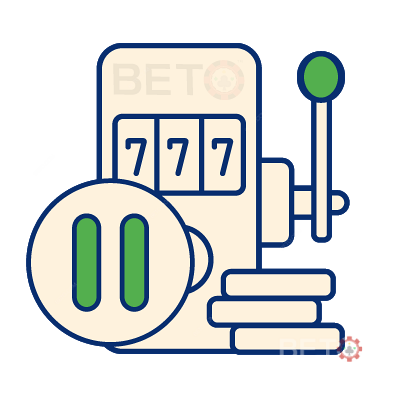
Always set a fixed budget and never exceed it
There is no one-size-fits-all answer to safe gambling, as the best way to gamble responsibly depends on your personal preferences and gambling habits. However, we have collected some tips on how to gamble responsibly:
If you follow these tips, you will be well protected from harm.
BACK TO TABLE OF CONTENTS

Are your gambling habits turning into a problem?
Gambling addiction, or ‘ludomania’, is a mental disorder characterized by an intense and persistent desire to gamble and a persistent inability to control gambling behaviour. Gambling problems can lead to significant financial, social, and personal problems.
People with a gambling addiction may continue to gamble even if it leads to financial ruin or other negative consequences. They may also continue to gamble even when it is clear that their odds of winning are very low.
Gambling addiction is a severe mental health condition that requires treatment. Treatment options include counselling, therapy, and medication. Many people who are addicted to gambling find that treatment works best when it is combined with other interventions, such as educational programs and support groups via the gambling commission.
According to statistics, being male puts you in significantly greater danger; however, this may change now that more and more women are playing online.
The age at which you first begin gambling is the next risk factor. Because the brain is still developing during the adolescent years, extremely young people who play online illegally may acquire life-long difficulties.
Finally, there is susceptibility for individuals with underlying mental health concerns such as ADHD, anxiety, and/or depression, particularly because persons with these conditions are not resistant to excessive risk and frequently expose themselves to being careless about the long-term effects.
BACK TO TABLE OF CONTENTS
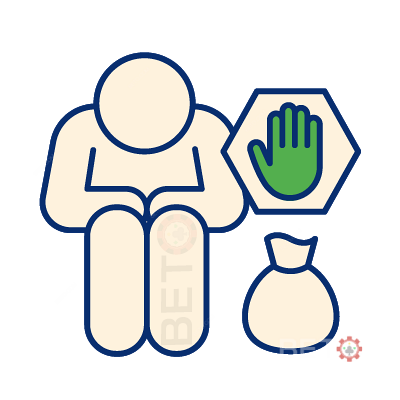
How Will I Know if I Have a Gambling Problem?
To determine whether your gambling is no longer enjoyable and may be out of control, ask yourself the following questions:
If you answered "yes" to any of these questions, you might need to use the advice below to take control of your gambling.
You may also take the anonymous 'Worried about your gambling?' survey on the BeGambleaware website and use their Gaming Calculator to see whether your gambling is becoming a problem.
BACK TO TABLE OF CONTENTS

Protecting Minors From Gambling Online
BETO has implemented a number of measures to keep our site safe for our customers. We require all new and existing players to provide their age verification information before they can start playing.
We also use multiple layers of security to prevent unauthorized access to our systems, and we regularly monitor for any suspicious activity.
Nonetheless, we know that individuals under the legal gambling age may acquire access to casino games, whether by using their parents' devices or having access to an adult's login data, so here are some important steps to keeping your children and minors safe:
BACK TO TABLE OF CONTENTS
Online casinos have teams of professionals who are trained to identify signs of gambling addiction in players. These teams work together to adhere to guidelines for combating addiction, and customer service staff are also trained to spot over-emotional behaviour in players. Additionally, casinos have developed tools to help players manage their own playing habits.
All reputable online casinos that you visit nowadays will have a Responsible Gaming section which will contain advice about how to play within healthy limits, the tools mentioned above, and links to professional organizations that are trained in treating addiction. This helps keep players safe and stops them from getting addicted to the casino.
BACK TO TABLE OF CONTENTS
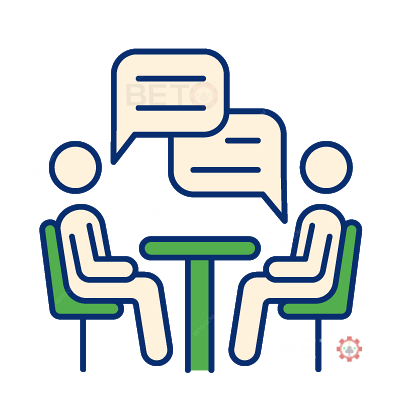
Get support if your gambling habits are getting out of control
Along with the National Gambling Helpline, there are numerous groups out there to support a gambling addiction. If you or someone you know needs help - try some of these great helplines that will offer confidential advice.
The National Gambling Helpline is a great resource for those struggling with gambling addiction.
There are many other groups out there that can offer support and assistance to those struggling with gambling addiction. If you or someone you know is struggling with gambling addiction, please reach out to one of these great helplines for help.



Responsible gambling is defined as gambling in a controlled and safe environment where the risks of developing a gambling problem are minimized. Responsible gambling involves setting limits on how much time and money is spent on gambling activities, as well as staying within those limits. Additionally, responsible gamblers make sure to only gamble with money they can afford to lose, and they never chase their losses.


Safer gambling means taking measures to ensure that gambling is conducted in a safe and responsible manner. This can include setting limits on how much money one can spend on gambling, as well as taking steps to prevent problem gambling.


BETO is working to protect players from gambling harm by providing information and resources on responsible gambling and we're working with gambling providers to promote responsible gambling practices. BETO also carry out research to better understand gambling-related harm.


If you have a gambling problem, you can contact the National Council on Problem Gambling at 0808 8020 133 or you can chat online directly with the friendly people from Gamcare: https://www.gamcare.org.uk/get-support/talk-to-us-now/


GambleAware®
Address:
Pennine Place
2a Charing Cross Rd
London WC2H 0HF
Phone: 0808 8020 133
email: info@gambleaware.org
 BETOs Newsletter
BETOs NewsletterBETO Slots | Tower Business Centre, 2nd floor | Swatar BKR 4013 | Malta | +356 2144 2245
Copyright 1999 - 2024. All Rights Reserved.